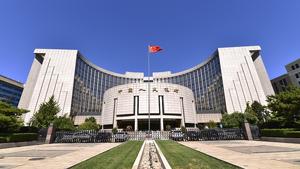 Headquarters of the People's Bank of China (PBOC), the central bank, is pictured in Beijing, Sept 28, 2018. (Photo / VCG)
Headquarters of the People's Bank of China (PBOC), the central bank, is pictured in Beijing, Sept 28, 2018. (Photo / VCG)
Financial regulators will take steps to control systemic risks and foster financial resilience amid the novel coronavirus outbreak, to prevent debt defaults in the corporate sector, officials said at a media conference on Monday.
"China's financial system remains stable and the surge in macro leverage has been curbed," said Peng Lifeng, deputy head of the Financial Market Department of the People's Bank of China, the central bank.
The overall leverage level, or the debt-to-GDP ratio covering the government, corporate and residential sectors, has been stabilized at around 250 percent, according to the PBOC.
China's financial system remains stable and the surge in macro leverage has been curbed
Peng Lifeng, Deputy head of the Financial Market Department of the People's Bank of China
ALSO READ: PBOC: China's economy has strong resilience
In general, China's financial risks are decreasing. Efforts to contain debt risk of internet financial services, shadow banking business and some large State-owned companies, have made considerable progress, said Peng.
The outbreak has increased pressure on companies in the transportation, tourism and entertainment sectors. To soften the negative impact, the central bank has provided 300 billion yuan (US$42.67 billion) in re-lending funds to commercial banks for lending to companies in difficulty.
Owing to economic downside pressure and the epidemic impact, companies with higher debt burden and leverage ratio will face more pressure in sustaining healthy cash flows, and additional supportive policies should be launched soon to limit the headwinds, said Wu Ge, a member of the China Finance 40 Forum and the chief economist with Changjiang Securities.
For companies that cannot repay the debt on the mentioned due dates due to the epidemic, financial regulators will allow them to roll over debt and provide preferential policies for loan risk classification. "We will closely monitor and assess (the potential risk). China's financial system has shown resilience in face of risks since the outbreak," said Peng.
According to the PBOC official, there are limited chances of default risks in the bond market as bonds issued by companies in the catering and tourism sectors account for just 1 percent of the total bond market and thus their debt defaults, if any, would not lead to any complications.
The central bank is planning to release more countercyclical monetary measures soon, including maintaining reasonably ample liquidity and adopting structural monetary policy tools and policy-based financing measures, PBOC Vice-Governor Chen Yulu said at a separate media conference on Monday.
READ MORE: PBOC denies report of adjusting property-related loan quotas
"The interest rate will decline as policies will focus on the need to reduce financing costs for enterprises," Chen said.
Lower interest rates can reduce financing costs for issuing bonds, which in turn will help companies to roll over debt. At the same time, the PBOC has given the green light for financial institutions and nonfinancial companies to accelerate the bond issuance process.
Although the total number of maturing corporate bonds is relatively large this year compared with 2019, the growth will be slower, which means bond default risks will also ease, Peng said.


